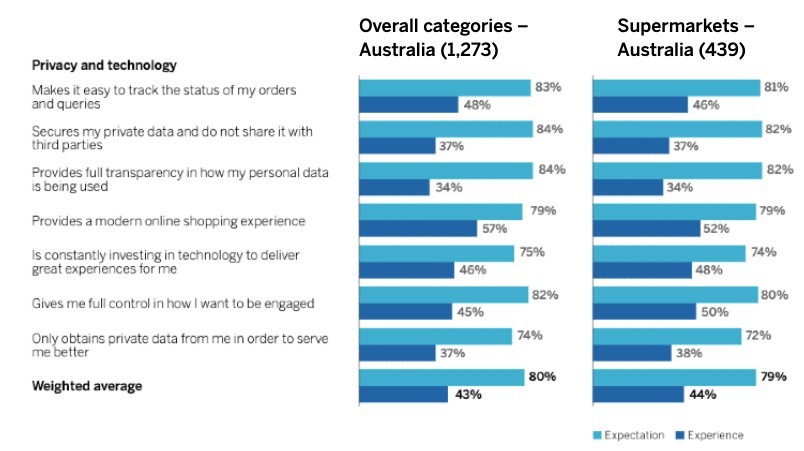Targeting men with make-up can work, but probably isn’t what advertisers intended. Why Australian businesses are getting data and personalisation all wrong, and how to fix it

Australians are some of the most privacy-conscious consumers in the APAC region.
There are supermarkets that don’t know which of their customers are vulnerable, retailers who think their male shoppers are women, and other businesses that are too afraid to personalise their customer experience – losing market share as a result. Australians are some of the most privacy-conscious consumers in the APAC region. Businesses need to match that awareness with action on data – or watch customers walk away.
Data protection laws are constantly evolving and restricting brands’ customer data practices. Knowing how to use data can provide a crucial edge in a competitive market.
Every so often, I get an email from a major Australian retailer offering me make-up tutorials and promotions. But I don’t wear make-up. It’s one of my favourite customer stories. Why? Because it’s something that could be fixed so easily by asking me a simple question. What is my gender?
Unfortunately, they have a system that has made assumptions on the back of my purchase history. I’ve made some purchases for my wife, and on the back of that they are making recommendations that are totally misaligned.
This is a classic case of customer expectations versus experience. What they need is a transparent request to collect that information, and to build trust through secure data and a deep understanding of their customers. It’s a simple mistake, but one that has profound implications for the business more broadly. And a lot of Australian businesses are making these mistakes.
A matter of trust
The past 18 months have accelerated digitisation to an unprecedented pace. Organisations have had to suddenly operate in hybrid online/offline worlds, sometimes pivoting to provide a consistent journey across all channels. It hasn’t been easy.
Companies face a dilemma: they need to truly know their customer to deliver hyper-personalised experiences that distinguish them from the competition. On the other hand, collecting and processing customer data is getting more complicated by the day.
Unsurprisingly, Australians don’t think businesses are doing well with data collection and personalisation. The trust isn’t there. A new study from Heart Matters for SAP SE found that 84 per cent of Australians want full transparency about how their data is used – but just 34 per cent have experienced this from a business. Little more than one in three Australians, 37 per cent, believe a business has kept their data secure. The trust just isn’t there.
Australians don’t think businesses are doing well with data collection and personalisation. The trust isn’t there.
Likewise, while 74 per cent of the Asia-Pacific region expects businesses to keep their data secure and not share it with third parties, that jumps to 84 per cent in Australia specifically. Today’s Australian consumers are privacy-conscious, digitally savvy and intentional about the information they share. That means they expect assurances that their data is secure.

Knowing how to use data can provide a crucial edge in a competitive market.
What you should do now
When brands collect customer data, they often keep it in siloed systems for fear of breaking data protection rules. We’ve had situations where supermarkets didn’t know the basic requirements of their customers: which were in a vulnerable age group that would benefit from extended shopping hours, for example.
Data protection laws are constantly evolving and restricting brands’ customer data practices. Knowing how to use data can provide a crucial edge in a competitive market and that’s where Artificial Intelligence and smarter technology should play a key role. Even at the anonymous stage, and as third-party cookies start making an exit, contextual personalisation for your customers should try to entice customers to share first-party data in a relationship based on a clear value exchange.
It is now vital for businesses to use data-driven insights to turn unknown visitors into known, loyal customers, and customers now expect personalised experiences.
Start by offering customers transparency and control of their own personal data. Not only does this give them a better understanding of your data practices, but it can also let them define their own experiences, to build trust. For businesses, there’s no better partner than an informed, empowered and data-driven customer.
Remember: the purchase history brands currently hold does not necessarily equate to purchase future and what brands do with that data matters to Australians – and regulators – more than ever.
To learn more on how to deliver personalised, trusted and connected customer experience, click here.
